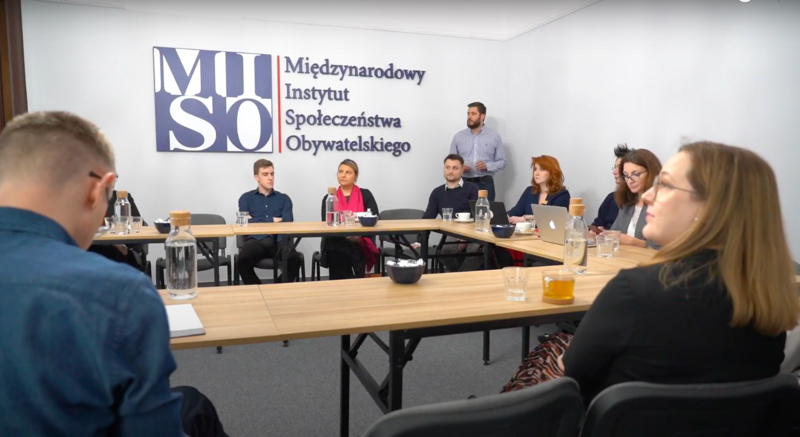Polish - U.S. Civil Society Roundtables - “Reacting to Fake News - Individual and Institutional Responsibility For Countering and Combating Disinformation”
The phenomenon of disinformation (including the prevalence of fake news) is one of the biggest problems of the 21st century. The spread of disinformation is related, among other things, to the development of social communication techniques and, consequently, widespread access to information. As disinformation is usually provided to entire populations rather than individuals, numerous misleading narratives, based on fake news, accompany global crises, such as the COVID-19 pandemic and the war in Ukraine.
The meeting began with a speech by Christopher Giles, who characterized the phenomenon of the so-called information overload and presented selected misleading narratives and discussed them using specific examples from the coronavirus pandemic and the war in Ukraine. “Over the past few years, we have seen a significant increase in communities that spread - in the EU and globally - misleading narratives about vaccines and conspiracy theories,” the speaker emphasized. The reproduction of incorrect/fake information from unverified sources became particularly common during the coronavirus pandemic, because the worldwide crisis was then being fought, affecting not only selected communities or countries, but the world at large.
In the age of the Internet, it is remarkably easy to construct a narrative that, with thoughtful structure and the right emotional focus, can spread very quickly. In his speech Christopher Giles also shared his conclusions on disinformation spreading among the community: “ The information may have its origins, for example, in the Telegram app, and then spread on Twitter or Facebook platforms. It is not only the authors of these messages who create this narrative, but entire communities that dynamically pass on fake news, without giving any thought at all to the content of the message being relayed and the consequences of such an action.”
Christopher Giles stressed that the scale of disinformation regarding COVID-19 vaccines was appalling. Anti-vaccination communities, based on, among other things, increasingly common overstimulation, along with the fear of an epidemic, could easily build a story around misinterpreted events meant to produce a fake news that would be noticed on the Internet. Giles also talked about a tool that was developed by researchers at the Stanford Internet Observatory allowing the recording of misleading content. The tool was developed in response to the huge scale of disinfomation regarding COVID-19.
Later in the meeting, Dr. Shelby Grossman delivered her presentation. She outlined and discussed the results of the study she and her team of researchers had conducted on the spread of fake news during the 2020 US presidential campaign. “The federal government was not prepared to search for and investigate domestic and foreign disinformation and fake news on this scale,” the speaker stressed. During the course of their research, Dr. Grossman's team determined that an intermediary body should be established to help address the issue – There was created a “Partnership for Election Integrity” initiative, which included two civil society groups and one academic group. “We decided that we would focus on attempts to prevent or discourage people from voting, as well as attempts to create information that delegitimizes election results,” the speaker added. Dr. Grossman also presented a platform, developed by her research team (including Stanford University students), that, among other things, owing to a tagging feature, is able to highlight misleading election narratives appearing on social networks. While recognizing the evolution of this platform over time and its contribution to more transparent elections, Shelby Grossman stressed that disinformation had a huge impact on current world events.
After the presentation, Dr. Shelby Grossman and Christopher Giles started a discussion with the participants of the meeting. The conversation was about the currently spreading disinformation focused on the war in Ukraine. The speakers offered tested in the U.S. solutions that could be helpful in countering fake news in Europe. The speakers also provided the meeting attendees with some tools they used at the Stanford Internet Observatory to analyze and research disinformation and fake news.
“Polish-U.S. Civil Society Roundtables” is a project implemented by the International Institute of Civil Society and the U.S. Embassy in Poland. These are cyclical meetings with the participation of American experts, in a roundtable format, on the development of civil society in selected thematic areas. The aim of the project is to exchange Polish and American experiences in raising civic competence and the development of civil society, with a particular focus on human rights, disinformation, media freedom, fundraising, and diversity and tolerance - depending on a topic of a given meeting. The format of each meeting includes an online speech by an American expert who presents the American perspective to the Polish audience gathered at MISO headquarters. After the speech, the moderator opens a discussion focused on sharing experiences and the best practices (with the participation of the US expert). The project is aimed at NGO and civil society leaders, lawyers, representatives of public administration, business and academia.


